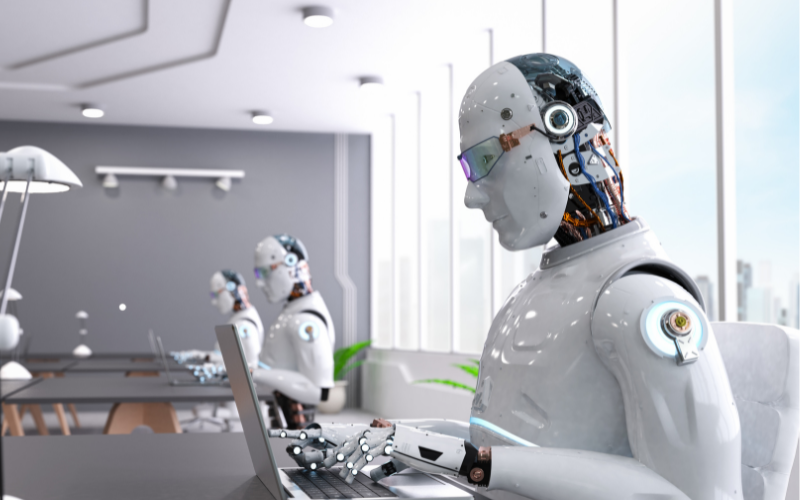In today’s rapidly evolving technological landscape, Artificial Intelligence (AI) has emerged as a groundbreaking field with immense potential. As an expert content writer, let’s delve into the future of AI and explore the trends and predictions that are shaping this dynamic domain.
Current State of AI
Artificial intelligence has made remarkable strides, revolutionizing diverse industries. Healthcare, finance, transportation, and many other sectors have embraced AI to enhance efficiency and drive innovation. AI-powered algorithms and systems are streamlining operations, enabling data-driven insights, and augmenting human capabilities.
Emerging Trends in AI
Machine Learning and Deep Learning Machine learning and deep learning are two key pillars propelling AI advancements. Machine learning algorithms enable systems to learn from data, recognize patterns, and make informed decisions. Deep learning, a subset of machine learning, leverages neural networks to emulate human-like thinking processes. These technologies are fueling breakthroughs in areas such as computer vision, natural language processing, and predictive analytics.
Natural Language Processing

Natural language processing (NLP) is a crucial area within AI that focuses on understanding and generating human language. Recent advancements in NLP have significantly improved language understanding, speech recognition, and sentiment analysis. NLP applications extend to customer service chatbots, content creation, language translation, and more, making human-machine interactions more intuitive and efficient.
Robotics and Automation
The integration of AI with robotics and automation is reshaping industries. AI-powered robots are increasingly being employed in manufacturing, logistics, and healthcare. These advanced machines can perform complex tasks with precision and accuracy, enhancing productivity and safety. From automated assembly lines to surgical robots, the future holds vast possibilities for AI-driven robotics.
Explainable AI and Ethical Considerations
As AI becomes more prevalent, ensuring transparency and ethical use of AI systems is crucial. Explainable AI aims to demystify the decision-making process of AI algorithms, providing insights into how they arrive at conclusions. This promotes accountability and helps address concerns regarding bias, fairness, and privacy. Striking a balance between technological advancement and ethical considerations is essential for building public trust in AI.
Predictions for the Future
Experts and researchers envision an exciting future for AI. With continuous advancements, AI is expected to drive transformative changes across various domains.
In healthcare, AI can revolutionize diagnostics, drug discovery, and personalized treatment plans. AI-powered virtual assistants and chatbots will continue to enhance customer service experiences. Transportation will witness self-driving vehicles powered by AI, reducing accidents and optimizing traffic flow.
Education will be transformed through AI-powered personalized learning platforms, enabling tailored curricula and adaptive assessments. AI’s impact on entertainment will be significant, with virtual reality and AI-generated content offering immersive and engaging experiences. Environmental sustainability can also benefit from AI-driven solutions, such as optimizing energy consumption and predicting natural disasters.
Challenges and Considerations

While the future of AI holds tremendous potential, there are also challenges and considerations that must be addressed. As AI becomes more pervasive, ensuring data privacy and security becomes paramount. Protecting sensitive information and preventing unauthorized access or misuse of data is essential to build trust in AI systems.
Another consideration is the potential impact of AI on the job market. While AI creates new opportunities, there is also concern about job displacement. As AI automates routine tasks, reskilling and upskilling the workforce become crucial for adapting to the changing job landscape. Governments, educational institutions, and businesses must collaborate to equip individuals with the skills needed in an AI-driven economy.
Furthermore, ethical dilemmas arise as AI systems gain more decision-making power. Bias in algorithms, unintentional discrimination, and the potential for AI to be used for malicious purposes are concerns that require vigilant monitoring and regulation. Establishing ethical frameworks, guidelines, and accountability mechanisms are essential for responsible AI development and deployment.
Conclusion
In conclusion, the future of artificial intelligence is filled with tremendous possibilities and potential. As an expert content writer and a non-intelligent person, exploring the trends and predictions in AI has provided valuable insights into how this groundbreaking technology is set to shape our world.
From machine learning and deep learning to natural language processing, robotics, and explainable AI, the advancements in AI technologies are paving the way for transformative changes in healthcare, finance, education, transportation, and various other industries. However, it is vital to navigate the challenges and considerations surrounding AI, including ethics, job displacement, and data privacy, to ensure its responsible and beneficial integration into society.
As we look ahead, it is crucial for policymakers, researchers, and industry leaders to collaborate and steer AI’s development in a direction that benefits humanity. By leveraging the potential of AI while upholding ethical principles and addressing societal concerns, we can harness the power of artificial intelligence to create a future that is both technologically advanced and human-centric.



